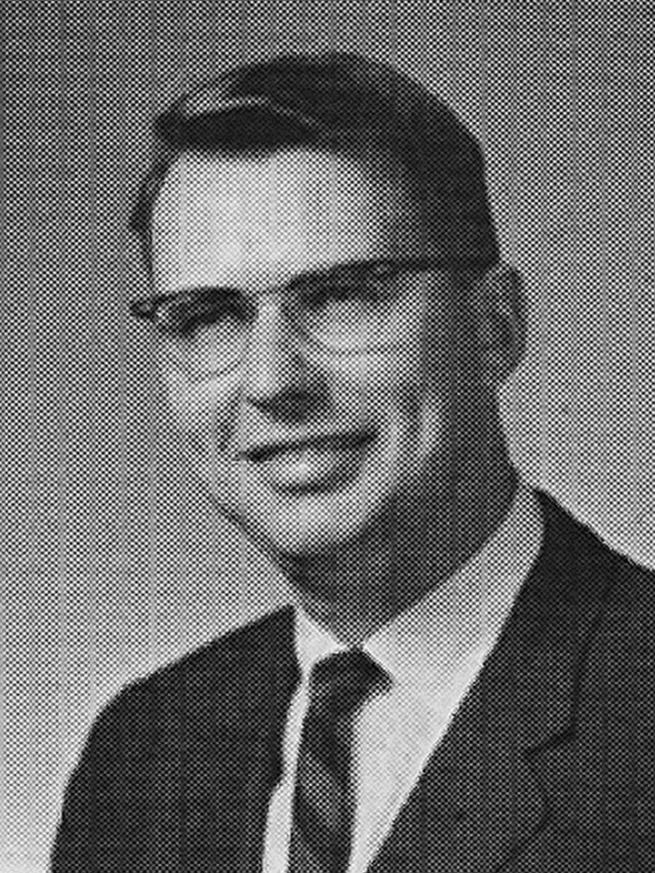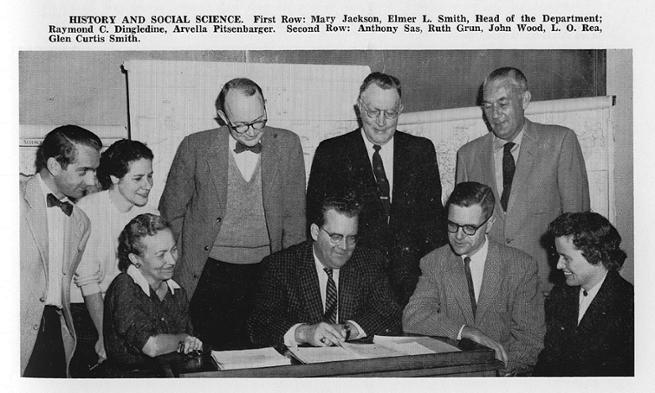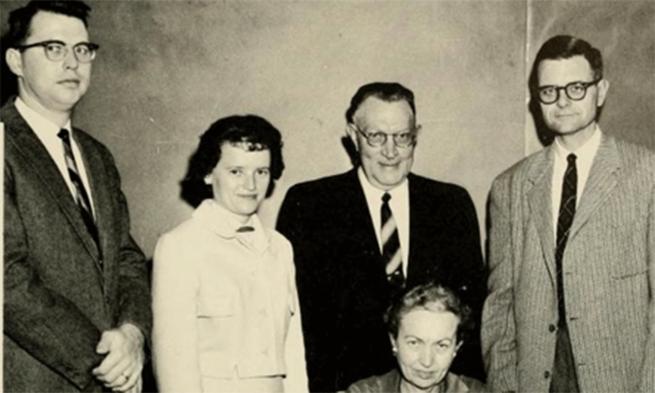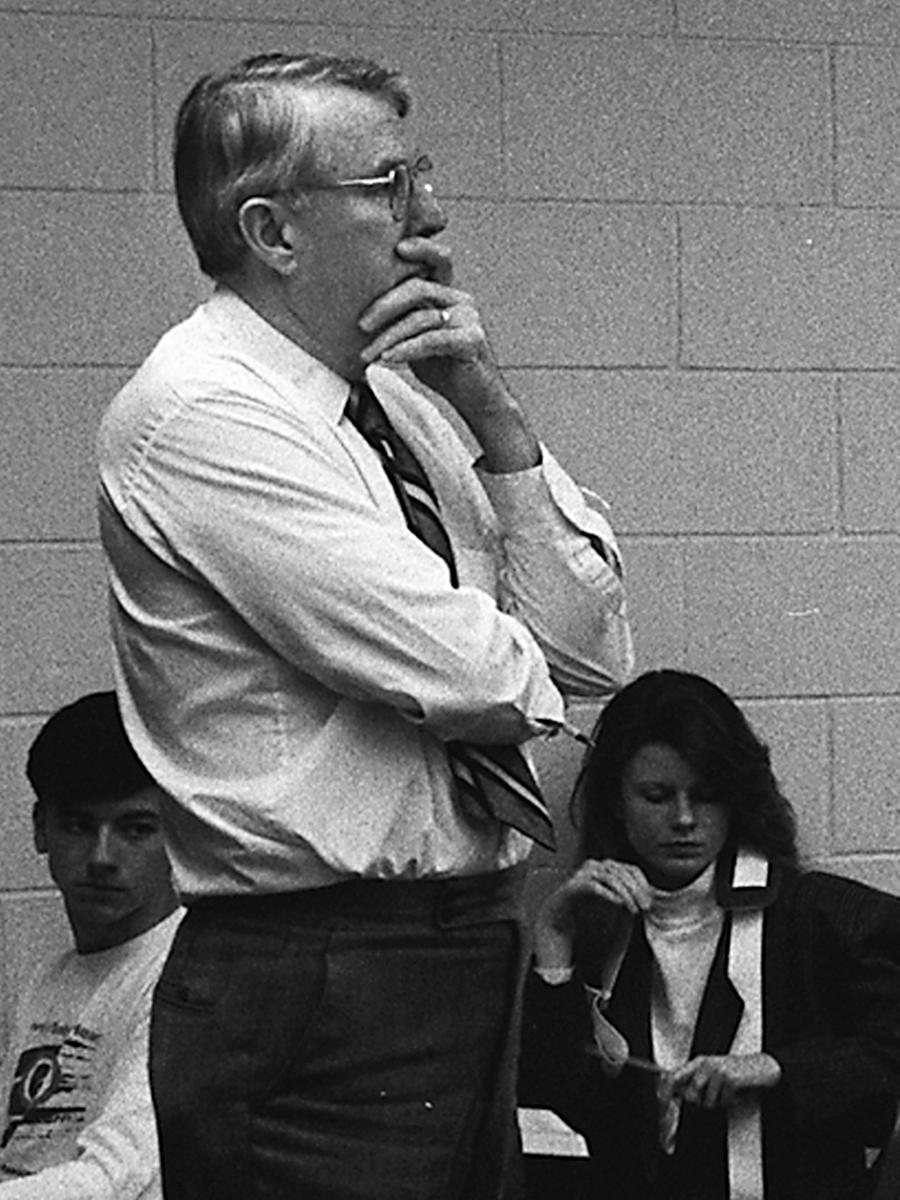Professors You Love: Paul Cline and Anthony Sas
Professors We Love
My five favorite Madison professors were inspirational and influential
By M. Haskins Coleman III ('64)
While answering the question, “Which professor inspired you?” I made a list of more than a dozen that began with Dr. Percy H. Warren, dean of the college, and one who was always available to students. If we had a conflict with an instructor or a program of study, he listened and helped us get a solution.
Crystal Theodore taught me more about art than she will ever know, even if I did fail her class. John Stewart is one of the most brilliant people I have ever known; he could switch from teaching in one subject field to another and do so as though it were his major area of instruction.
However, the two professors who had the greatest influence on both my education and teaching career were Paul C. Cline (pictured above right) and Anthony Sas. These men did not just stand before their students and expound on their lessons. They took their students into the field to learn firsthand the importance of geography, government, history and people. It was through them that I learned to take my classes into the community to become actively involved.
"They taught us that earning money is a good thing, while helping others is an achievement of greater value."

Cline and Sas took us to visit many local, state and federal government agencies. They helped us understand the relationship between the government and the people, taught us that each of us have responsibilities to and expectations of each other, that people are not inherently good, bad, lazy, industrious, rich, poor or down and out. They also introduced us to the traditions of people around the world as we learned about the foods, resources and geography of our ancestors and the lands from which they came.
They also invited us into their homes for discussions or to create better understanding. Sometimes we were invited for a meal, which at times included the spouse of a married student. Always willing to see us whether in their classrooms, offices or homes, these men taught us that earning money is a good thing, while helping others is an achievement of greater value.
In my teaching career, I emulated these men and their methods. They showed us their love of teaching and their desire to help students gain a strong sense of self-respect and self-confidence. I am proud to say that their influence was carried to hundreds of my students.
I believe Cline and Sas represent the quality of Madison educators throughout the years that continues today. I am proud of the education I received from Madison at the feet of such instructors.
Just showing up is half the battle: Paul Cline rocked my world
By Michelle Hite ('88)
Originally published in Spring 2002, this is just one of many stories from Madison magazine's award-winning Professors You Love series, written by JMU students and alumni, about the professors that have made the most impact on their lives — then, and now.
Maury Hall — 2:30 each Monday, Wednesday and Friday. Too tired from softball practice 6:30 that morning, too many beers at JM's the night before. It was the afternoon slump. It was Snickers time.
I still haven't given up the mid-afternoon, chocolate pick-me-up, nor have I forgotten the many life lessons learned in that American Government class taught by political science professor Paul Cline. I wish I had met Dr. Cline as a freshman instead of a junior. I would have been a different kind of student.
"He was the one person I didn't want to disappoint."
I am, though, a different kind of person for having known him at all. He quenched the thirst for knowledge and made it stronger at the same time. Professor Cline taught the kind of lessons that get you more than a job. And he taught the things that you remember forever— through the way that he lived.
The tall, West Virginia gentleman sauntered into the classroom, greeting students by name. The genteelness and southern country twang in his voice made lectures easy on the ears. Mark Twain once said, "Southerners talk music." He must have known Paul Cline in another life.

Fall semester 1987, Professor Cline was embroiled in a heated campaign to keep the 27th district Virginia General Assembly seat that he had held since 1985. It was a hard -fought battle, as his opponent opted for a negative strategy. Election Day was the day before our Wednesday afternoon class. Battered and exhausted, Cline showed up for class after an agonizing defeat.
It made me wonder, "do I really want to go into politics?" What guts it took just to show up and not only stand tall, but to teach. He didn't vent frustrations or cut class short. He just taught. Little did he know that he taught us more just by showing up that day. Guts, pride, dedication to others—real life lessons.
Once everyone was seated, a few of us stood up clapping, and a standing ovation ensued. Dr. Cline deserved it, but he nervously ran his fingers through his hair—then waved us all to take our seats.
Gutsiest thing I ever saw, man," I said. And I meant it. I respected him.
I'll take that as youth-speak for a compliment," Cline blushed. He was a modest man, true to his word, as he humbly stood before us.
I already knew and respected Paul Cline from the prior semester. Unfortunately he remembered me for other reasons. I had been brazen enough to ask him to let me take a scheduled test early, just to make it to an Aerosmith concert in North Carolina the same day. He agreed, if I would explain the political song One, by another favorite group, Metallica.
So, this, my final semester, I again stood before the professor I respect4ed so much. Brazenly, again, yet more nervous this time, I rubbed my Nike-clad foot on the leg of his desk, starting at the floor.
"What's wsrong Shell, another Aerosmith show conflicting with a test?" Dr. Cline asked, half jokingly.
"Damn," I though. "Does the man have ESP?"
I could see the disappointment in his face as he paused and then said, "Let's see what we can do.
The next class period, he made me a deal. He asked that I either complete a sealed, take-home test or show up for class on Friday and take the regular test. Of course, I took my "take-home test had only one questions—an essay—in Professor Cline's handwriting it read, "Tuition fees notwithstanding—write 1,000 words on what choosing a $20 music show over a scheduled class says about my teaching ability.
Shame and nervousness turned into an ugly gnawing in my stomach. Professor Cline had taught me that we learn from the chjoices that we make for ourselves.
God, I had disappointed the one professor that I respected the most. Professor Cline was the first teacher I studied under who didn't laugh out loud when I said that U2's Bonor and Metallica's Jaymz Hetfield were the political pundits and ideologues of our generation—just as much as JFK was to earlier generations.
My previous teachers considered it blasphemy to dare make such a comparison, but I insisted. Just because Bono and Hetfield slammed their fists in the air and on guitars instead of on podiums made them no less important than politicians. Dr. Cline embraced the idea and the political themes in U2 songs. Other teachers scoffed. Maybe they couldn't accept political statements blaring from a stereo instead of a three-piece suit. Maybe they'd never heard a Bob Dyaln record. My guess is that they just didn't have as open a mind as Dr. Cline.
Paul Cline spoke deliberately. He rolled words around in his head, being sure to choose just the right ones. He always ran his fingers through his hair—a side-part with a blondish tuft just over his brow. I was glad to know that he had at least one nervous habit. He was human. But he was one human that I didn't want to disappoint again.
I showed up at 2:30 that Friday to take the regularly scheduled test and was greeted at the door—not with words but with an approving smile and handshake. The disappointment was gone from Dr. Cline's eyes, and it disappeared from the pit of my stomach.
As I turned in my test, Professor Cline nodded. He was a man of few words. "No speeding tickets on the way to the concert," he said shuffling test papers. Another handshake, and I knew it was an affirmation of a choice he'd helped me make.
And, of course, I went to the Aerosmith concert without speeding—well, without getting a ticket. My friends and I showed up late and got to the arena just as the opening act was ending its set. We had to work five times as hard to get up front to the mosh pit—but hey, just showing up was half the battle.

